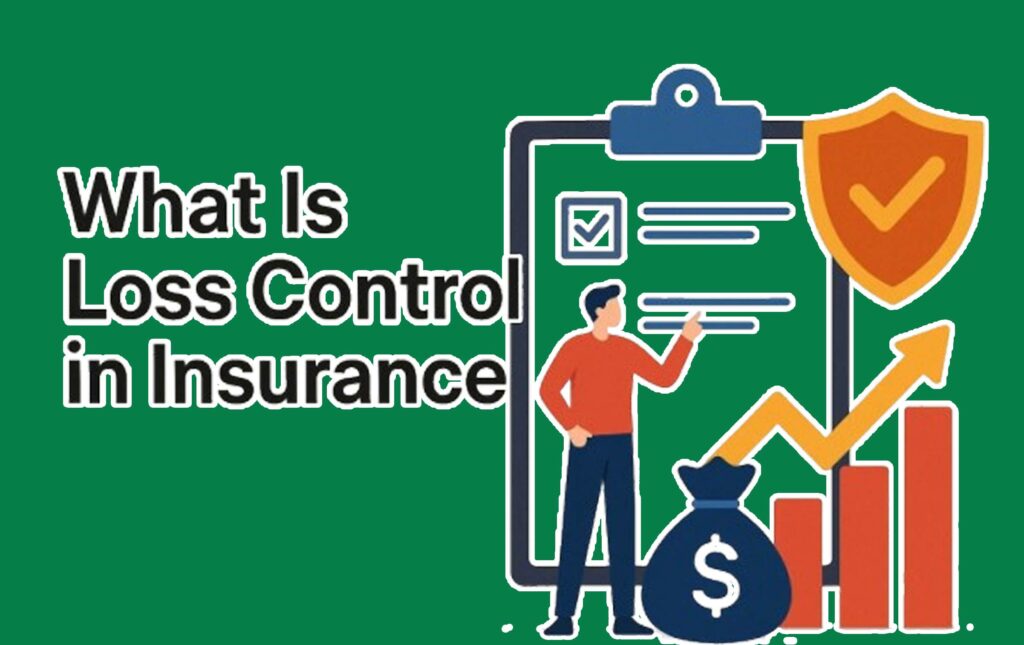Insurance loss control is typically a proactive approach to reduce risks and stop any losses before they occur. To help people and businesses safeguard their investments, this approach entails identifying, evaluating, and reducing risks related to specific operations, assets, or activities the person or business is engaged in.

Through the implementation of effective loss control strategies, insurance companies can lower premiums, raise safety standards, and reduce the frequency and severity of claims. It can be used for any risk or losses related to fire, car crashes, burglary, and electrical surges.
If you seek to protect yourself or your business from being exposed to potential risk and damage. You need to understand that insurance loss control is crucial. Here, in this article, we will explain what insurance loss control means, and how it works. In addition, we will discuss the examples and the advantages that businesses can have from implementing a thorough loss control strategy.
What Is Loss Control?
Typically, loss control is a form of risk management technique that aims at preventing potential losses. And reducing the severity of the ones that already occurred. One of the primary benefits of the loss control strategy is that it helps policyholders to reduce claims made on their policy. Not only that, insurance companies as well can reduce losses that could affect their financial strength through this strategy.
How Does it Work?
Most insurance companies incorporate loss control strategies into the insurance products they sell to people. This is essentially to help policyholders reduce the likelihood of risk and potential damage from occurring. As earlier said, this insurance is beneficial to the policyholder and the insurance company. For the policyholder, you get lower premiums, and the insurance company tends to pay out less on claims filed by the insured.
Loss control strategy applies to several types of insurance products, be it homeowners insurance, car insurance, commercial general liability, or worker’s compensation insurance. If you bought an insurance policy, clarify your doubts with the insurance company. Check the guidelines provided by the insurer that would help to reduce risks of any loss or damage that would make you file a claim later on.
Essentially, the goal of this insurance is to mitigate the possibility of risk and other potential damage to the insurance company, as well as the policyholder.
How Does Insurance Loss Control Affect Premiums?
Typically, when you implement a loss control strategy, you can potentially reduce the cost of your insurance premiums. The primary aim of insurance companies providing this strategy is to help policyholders reduce risk in their business and personal lives. Thus, helping to cut down the cost of insurance. When a policyholder takes preventive measures to ensure that claims are not frequently made. It helps to save money that you will most likely need along the line when you file a claim.
Nevertheless, it is worthy of note that discounts on premiums are not guaranteed, as other factors can potentially impact your insurance premiums. Most insurance companies consider certain factors before charging you for a premium. If, after evaluating your application alongside other necessary factors, getting lower premiums will be contingent on the insurer’s assessment.
Examples
Let’s make use of homeowners insurance and car insurance as our examples in showing explicitly how loss control works in insurance. In your homeowner’s insurance, your insurance provider would take certain measures that guarantee a reduction of risks and damage to your home, such as the installation of
- Fire extinguishers
- Smoke detectors
- Sprinkler systems
- Generators
- Deadbolts
- Monitored alarm systems
With these preventive measures put in place, in the event of a fire accident, the loss or damage incurred will be manageable. It is possible for a fire accident to also be prevented through monitored alarm systems and smoke detectors. Essentially, this would help to increase the safety and security of your home from potential hazards.
For car insurance, to reduce the likelihood of getting into accident. Or making frequent claims, you can take a course in defensive driving. To also prevent your car from getting stolen and damaged, it is advisable to install anti-theft devices in your car. Another way you can also protect your car from risk and damage is by parking in a garage.
Advantages of Insurance Loss Control
Meanwhile, loss control is an effective strategy that can be used to prevent and reduce risks or damage. Enumerated below are the benefits attached to insurance loss control:
- Reduction in insurance premiums.
- Minimized risk of loss
- Improved safety standards.
- Likelihood of fewer claims.
- Protection of assets.
By implementing a loss control approach in insurance, the management of risk will be a lot easier for both policyholders and insurance companies.
FAQs
What is insurance loss control?
Insurance loss control typically refers to practices and strategies that are employed to reduce risks and prevent losses, adversely helping to lower insurance premiums and the likelihood of claims.
Is loss control applicable only to businesses?
Of course not! Aside from business owners, car and homeowners can apply this proactive approach in any type of insurance coverage they purchase. If you buy coverage for personal liability of the safety of your home. You can implement loss control practices in your policy.
Who conducts loss control assessments?
Most insurance companies hire risk management professionals and specialized loss control consultants when assessing the risk of policyholders and how it can be managed.



